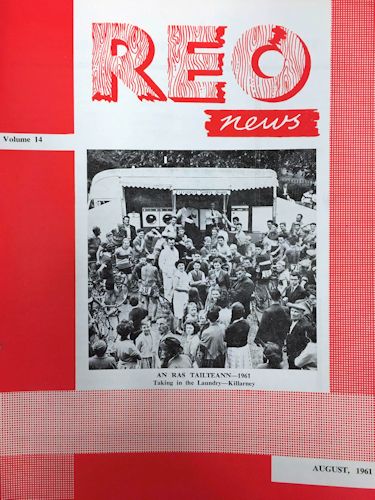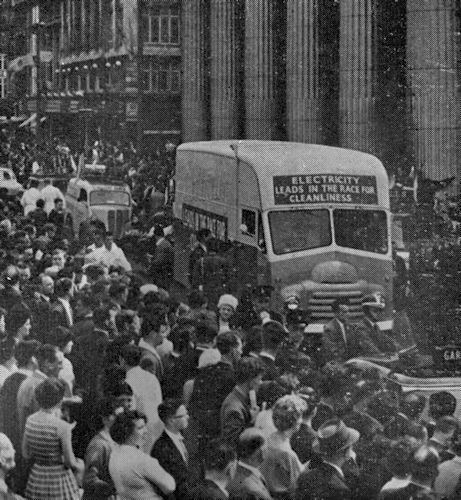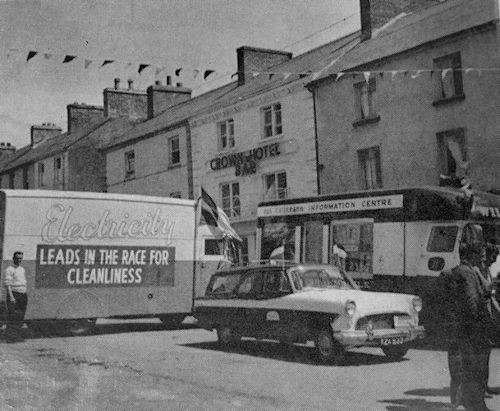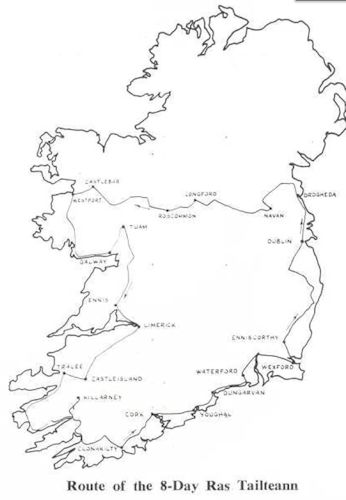|
Rás Stories In the summer of 1961, staff from ESB’s Rural Electrification Office (REO) took to the road with the Rás Tailteann, a national multi-stage cycle race across Ireland. Instead of bicycles, their mode of transport for the race was a rather large Mobile Display van known as LIK 650. This large demonstration vehicle, traditionally used for local shows around the Cork area, was relieved of its usual duties on this particular occasion and dispatched to Dublin to undertake an important if not somewhat unusual mission. In articles which appeared in the August and September 1961 issues of ESB’s REO News magazine, the driver of the vehicle B.M McEneaney recalls his adventures on the road with the Rás and describes the part played by the Rural Electrification Office in helping to keep the show on the road. He recounts how in an attempt to ‘generate considerable goodwill for the ESB all along the route’, the Rural Electrification Office offered to provide a mobile laundry service to the teams competing in the Rás, an offer which was warmly welcomed by the event organisers. Emblazoned with the slogan ‘Electricity Leads the Race for Cleanliness’ the LIK 650 and its crew were ready for action! Departing from Dublin’s Parnell Square, the cavalcade set off on Sunday, June 25, 1961. The REO mobile unit joined in the parade through O’Connell Street past the GPO where excited crowds waved the competitors off on the first 73 mile stage to Navan. Mr McEneaney described his surprise at the speed with which the competitors made their way around the course, with their average cruising speed reaching 25 mph! Before they had reached their destination, the REO driver and his companion were called into action when they encountered a casualty along the route. After providing First Aid to the injured cyclist with a lacerated arm, it was on to Navan where the injured party received 11 stiches in hospital. After this dramatic start to the day it was soon time to get set up for the job at hand. Joined by their ESB colleagues from the Navan area and equipped with several Burco boilers and washing machines, operations got underway. By 8.30 that evening the competitors were arriving at their destination and with them came an avalanche of “wet team jerseys, singlets, shorts, socks, handkerchiefs, caps and even oil-stained dungarees.” Once washed, the next challenge was drying the garments. The spin dryers available to them proved somewhat unequal to the task and ESB’s Navan offices were soon filled with clothes lines with convector heaters and storage heaters employed to speed up the job. In his REO News article, B.M McEneaney reported: Of course the 500 odd items of clothing which were handed in presented a problem. It was not so much the trunks or heavy woollen socks or even the oil-stained dungarees but rather the heavy woollen jerseys whose colours were inclined to run. I’m glad to say that apart from this there were no difficulties. There was one small snag however. It was not, as you might have thought, the fact that some of the competitors forgot to remove their biscuits, chocolates and sunglasses from their garments, but rather that the garments themselves were not marked for identification, and consequently the competitors became a little confused each considering the better garment was his own. Apart from this, as I said before, everything went smoothly. There was one last snag which, no doubt, you have guessed, was the difficulty of getting the clothes lines erected in the A.E.’s office. This was minimised by the thought of the opposition we would meet if we were to seek to have the race postponed for a day – although there were advocates for this latter course during the early hours of Monday morning.
A request was made for additional dryers and four tumble dryers arrived from Dublin the next day. Despite these minor setbacks, the crew successfully laundered over 500 items overnight which were gratefully received by the cycling teams’ personnel the following morning. And so the adventure continued as the Rás moved west, through Longford and Roscommon and on to Castlebar, Co. Mayo. From there it was on to Castleisland, Co. Kerry, a 128 mile trip via Athenry, Ennis, Limerick and Newcastle West. The next stop was Clonakilty, Co. Cork and then onto Wexford with the final leg to Dublin taking in the challenging terrain of the Wicklow Mountains. At the end of each stage the Mobile Laundry Unit kicked into gear. Enthusiastic crews of ESB demonstrators, sales representatives, electricians and local staff were on hand at each location to support efforts to keep the competitors looking bright and fresh as they raced across the country. The busy action of the new modern washing machines and dryers attracted much attention among interested onlookers and local press along the way. With its work now done, the REO Mobile Laundry Unit and its crew arrived in the Pheonix Park a week later, just in time to join in the rapturous welcome for the heroes of the Rás and cheer on the victorious Dublin team over the line. © Copyright FBDInsuranceRás.com |




